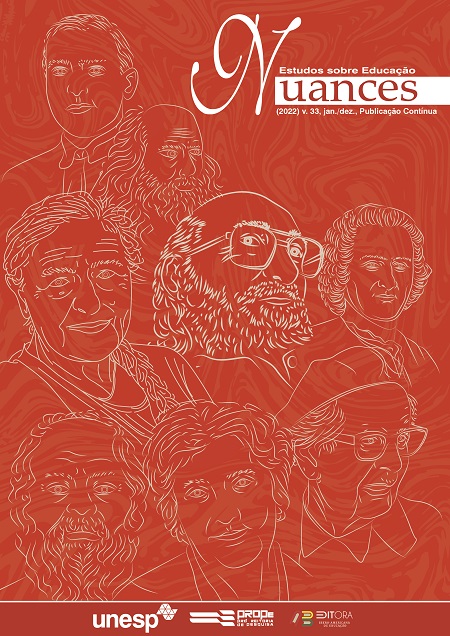Ancestral pedagogy
An investigation into the existence and resistance of the identity of the quilombola community of Alto do Capim, Quixabeira-Bahia
DOI:
https://doi.org/10.32930/nuances.v33i00.9484Keywords:
Pedagogia, Ancestralidade, Pedagogia ancestralAbstract
This article is the result of an ethnographic research carried out in the Quilombola community of Alto do Capim that sought to investigate: How does an ancestral pedagogy contribute to the preservation of the identity of the Quilombola Community of Alto do Capim, in Quixabeira-BA? For this investigation it was necessary to understand how an ancestral pedagogy contributed to the existence and resistance of the identity of the Quilombola Community of Alto do Capim, in Quixabeira-BA; understand the relationships between pedagogy and ancestry; establish the importance of ancestral pedagogy for the preservation of the identity of quilombola communities; Get to know the history of the Quilombola Community of Alto do Capim and challenge the elements that foster ancestral pedagogy in the Quilombola community of Alto do Capim. Therefore, it is concluded that this is the Quilombola Community of Alto do Capim, the informal education processes have historical and cultural documents, since there is little self-recognition of ancestry in the community.
Downloads
References
ABUD, K. M. Temporalidade e didática da história. Revista Fóruns contemporâneos de ensino de história no Brasil, Campinas, p. 31-35, 1997. Disponível: http://ojs.fe.unicamp.br/index.php/FEH/article/view/5025. Acesso em: 23 apr. 2021.
ABUD, K. M.; SILVA, A. C. M.; ALVES, R. C. Ensino de História. São Paulo: Cengage Learning, 2013.
ABA. Associação Brasileira de Antropologia. Documento do Grupo de Trabalho sobre Comunidades Negras Rurais. Rio de Janeiro: ABA, 1994.
ALMEIDA, A. W. B. Os Quilombos e as Novas Etnias. In: O’DWYER, E. C. (org.). Quilombos: Identidade étnica e territorialidade. Rio de Janeiro: Editora FGV, 2002.
BRASIL. Constituição da República Federativa do Brasil de 1988. Brasília, DF: Presidência da República, 1988.
BRASIL. Ministério da Educação. Conselho Nacional de Educação. Câmara de Educação Básica. Resolução n. 8, de 20 de novembro de 2012. Define Diretrizes Curriculares Nacionais para a Educação Escolar Quilombola na Educação Básica. Brasília, DF: CNE, 2012. Disponível em: https://normativasconselhos.mec.gov.br/normativa/view/CNE_RES_CNECEBN82012.pdf?query=ensino%20m%C3%A9dio. Acesso em: 15 mar. 2020.
BRASIL. Guia de Políticas Públicas para Comunidades Quilombolas. Brasília, DF: Programa Brasil Quilombola, 2013. Disponível em: https://seppirhomologa.c3sl.ufpr.br/xmlui/bitstream/handle/123456789/1131/seppir%20guia%20de%20politicas%20publicas.pdf?sequence=-1&isallowed=y. Acesso em: 20 fev. 2021.
GIL, A. C. Como elaborar projetos de pesquisa. 4. ed. São Paulo: Atlas, 1999.
LÜDKE, M.; ANDRÉ, M. Pesquisa em educação: Abordagens qualitativas. São Paulo: EPU, 1986.
HAESBAERT, R. Dos múltiplos territórios à multiterritorialidade. Porto Alegre: UFRGS, 2004.
LIBÂNEO, J. C. Pedagogia e pedagogos, para quê? São Paulo: Cortez, 1998.
MACEDO, R. S. Currículo e complexidade: A perspectiva crítico-multirreferencial e o currículo contemporâneo. 2. ed. Salvador: EDUFBA, 2000.
PORTELLI, A. Ensaios de história oral. São Paulo: Letra e Voz, 1997.
SCHIMIED-KOWARZIK, W. Pedagogia Dialética. São Paulo: Brasiliense, 1983.
Published
How to Cite
Issue
Section
License
Copyright (c) 2022 Nuances: estudos sobre Educação

This work is licensed under a Creative Commons Attribution-NonCommercial 4.0 International License.
Atribuição-NãoComercial
CC BY-NC
Esta licença permite que outros remixem, adaptem e criem a partir do seu trabalho para fins não comerciais, e embora os novos trabalhos tenham de lhe atribuir o devido crédito e não possam ser usados para fins comerciais, os usuários não têm de licenciar esses trabalhos derivados sob os mesmos termos.





